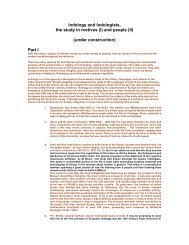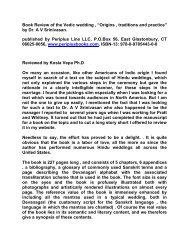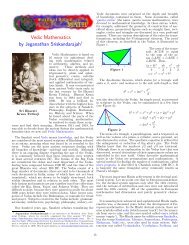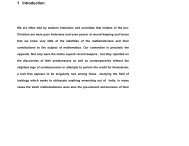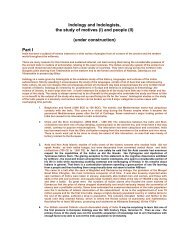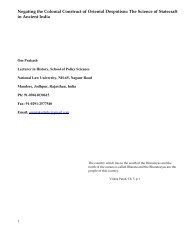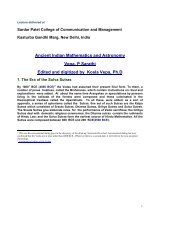The Dhaarmik Traditions - Indic Studies Foundation
The Dhaarmik Traditions - Indic Studies Foundation
The Dhaarmik Traditions - Indic Studies Foundation
You also want an ePaper? Increase the reach of your titles
YUMPU automatically turns print PDFs into web optimized ePapers that Google loves.
D. : Yes.<br />
H.H. : Do we stop from pulling out the nail simply because we happen to be ignorant<br />
of the length of the nail in the wood or of the number and intensity of the strokes<br />
which drove it in Or, do we persist in pulling it out by increasing our effort<br />
D. : Certainly, as practical men we adopt the latter course.<br />
H.H. : Adopt the same course in every effort of yours. Exert yourself as much as you<br />
can. Your will must succeed in the end.<br />
Function of Sastras:<br />
D. : But there certainly are many things which are impossible to attain even after<br />
the utmost exertion.<br />
H.H. : <strong>The</strong>re you are mistaken. <strong>The</strong>re is nothing which is really unattainable. A<br />
thing, however, may be unattainable to us at the particular stage at which we are, or<br />
with the qualifications that we possess. <strong>The</strong> attainability or otherwise of a particular<br />
thing is thus not an absolute characteristic of that thing but is relative and<br />
proportionate to our capacity to attain it.<br />
D. : <strong>The</strong> success or failure of an effort can be known definitely only at the end.<br />
How are we then to know beforehand whether with our present capacity we may or<br />
may not exert ourselves to attain a particular object, and whether it is the right kind<br />
of exertion for the attainment of that object<br />
H.H. : Your question is certainly a pertinent one. <strong>The</strong> whole aim of our Dharma<br />
Sastras is to give a detailed answer to your question. Religion does not fetter man's<br />
free-will. It leaves him quite free to act, but tells him at the same time what is good<br />
for him and what is not. <strong>The</strong> responsibility is entirely and solely his. He cannot<br />
escape it by blaming fate, for fate is of his own making, nor by blaming God, for he<br />
is but the dispenser of fruits in accordance with the merits of actions. You are the<br />
136



